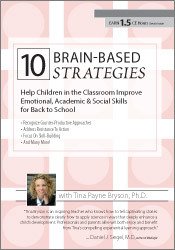

Bridging the Gap Between What Experts Know and What Happens at Home & School
In this recording, best-selling author Dr. Tina Payne Bryson (co-author with Dan Siegel of The Whole-Brain Child) discusses the challenges she most frequently addresses with parents, students, educators, and professionals when it comes to kids in the classroom. At school, many children have emotional, academic, and social hurdles to overcome. This DVD will discuss how to create new associations with learning and the school environment, and how to help kids build skills and become resilient.
Using stories, case examples, and plenty of humor, Dr. Bryson explains ten simple, scientifically grounded strategies that will help children transition back to school, be confident students, and have a successful academic year. Attendees will be exposed to the most important and frequent perspectives and strategies Dr. Bryson teaches parents, educators, and mental health professionals in her office as a pediatric and adolescent psychologist, and as the School Counselor at St. Mark's School in Altadena, California.
This online program is worth 1.5 hours CPD.
| File type | File name | Number of pages | |
|---|---|---|---|
| Manual - 10 Brain-Based Strategies in the Classroom (282.7 KB) | 16 Pages | Available after Purchase | |
| Manual - 10 Brain-Based Strategies in the Classroom (282.7 KB) | 16 Pages | Available after Purchase |

Tina Payne Bryson, Ph.D., is the co-author (with Dan Siegel) of two New York Times bestsellers, The Whole-Brain Child (Bantam, 2012) and No-Drama Discipline (Bantam, 2016), as well as The Yes Brain (Bantam, 2019). Dr. Bryson is also the co-author (with Dan Siegel, M.D.) of The Whole-Brain Child Workbook (PESI, 2015) and No-Drama Discipline Workbook (PESI, 2016). She is the executive director of the Center for Connection in Pasadena, CA, and a pediatric and adolescent psychotherapist. She keynotes conferences and conducts workshops for parents, educators, and clinicians all over the world. Dr. Bryson earned her Ph.D. from the University of Southern California, where her research explored attachment science, child-rearing theory, and the emerging field of interpersonal neurobiology.
Speaker Disclosures:
Financial: Tina Payne Bryson has employment relationships with The Center for Connection, The Play Strong Institute, and Saint Mark's Episcopal School. She receives royalties as a published author. Tina Payne Bryson receives a speaking honorarium, book and recording royalties from PESI, Inc. She has no relevant financial relationships with ineligible organizations.
Non-financial: Tina Payne Bryson serves on the advisory board for Austin Interpersonal Neurobiology and Fuel Ed. She is a member of the National Association of Social Workers, is a distinguished member of the San Gabriel Valley Psychology Association, and a member of Sensorimotor Psychotherapy Institute.
Reinterpret & Shift Maladaptive Behaviors
Understand Neural Associations for learning & emotion
Prepare a Child for Success & Resiliency
| 5 |
|
| 4 |
|
| 3 |
|
| 2 |
|
| 1 |
|
Satisfaction Guarantee
Your satisfaction is our goal and our guarantee. Concerns should be addressed to info@pesi.co.uk or call 01235847393.
Please wait ...